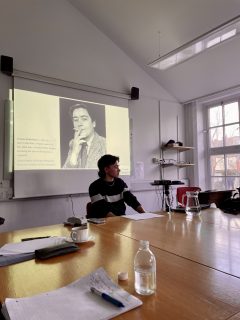Noë Bourdeau Delivers Seminar Paper at Oxford
PhD student Noë Bourdeau presented preliminary research findings from his dissertation at Professor Zoe Waxman’s Seminar on the Holocaust and Memory, part of the Oxford Centre for Hebrew and Jewish Studies.

Bourdeau’s research bridges the fields of Holocaust studies and transgender studies to foreground the role of gender mutability across identities during the Third Reich and Shoah. Drawing on select oral-history interviews and life-writing documents from archives such as the Jeff and Toby Herr Oral History Archive at the United States Holocaust Memorial Museum, the USC Shoah Foundation Visual History Archive, and the Fortunoff Video Archive for Holocaust Testimonies, it identifies moments of gendered boundary crossing in testimony documents to explore how a trans* reading of these sources can expand ways of thinking about sexuality, gender, emotions, survival, and power in the context of the Holocaust. The goals include resurfacing aspects of this history that have been obscured within current methodological frameworks. Burgeoning literature on LGBTQ+ history during the Third Reich has focused primarily on criminal, legal and medical documentation. It expands the scope of this scholarship by extending trans* analysis to oral-history interviews to further consider gender as performative, non-static and situated in specific times and places. Bourdeau’s research enhances understandings of how gender variance appeared, as historian Laurie Marhoefer has suggested, in situations characterized by emotion, choice, and risk. In this way, the project represents a robust investigation into the conditions of gender non-normativity in the context of National Socialism and the Holocaust.